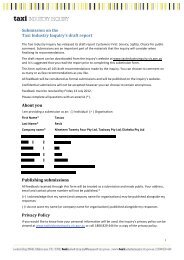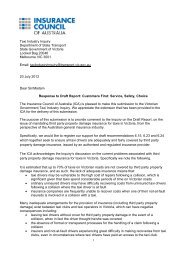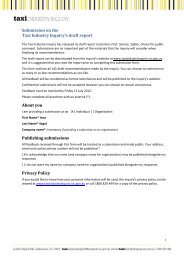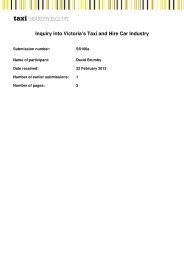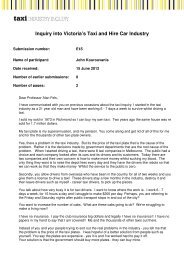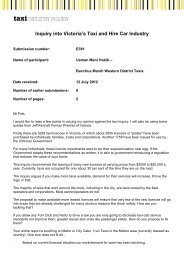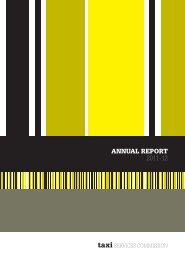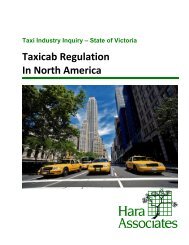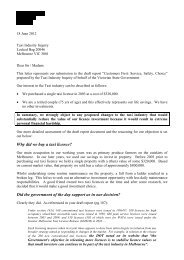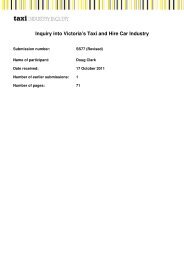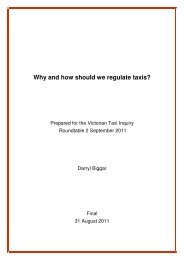Part D â Understanding and improving industry performance (PDF ...
Part D â Understanding and improving industry performance (PDF ...
Part D â Understanding and improving industry performance (PDF ...
You also want an ePaper? Increase the reach of your titles
YUMPU automatically turns print PDFs into web optimized ePapers that Google loves.
Merging the taxicab markets of two closely related<br />
adjacent cities can improve market efficiency, even<br />
when taking the existence of extranormal profits into<br />
account. The number of available taxicabs increases<br />
as taxicabs are allowed to pick up passengers in the<br />
adjacent city. If the taxicab <strong>industry</strong>’s profit allowance<br />
is left unchanged, the benefits of the merger can be<br />
passed on to consumers through lower prices <strong>and</strong><br />
wait times. 91<br />
Flores-Guri further noted that the higher the probability of<br />
rides that cross zones, the larger the gains in efficiency.<br />
Further, <strong>and</strong> critically, Flores-Guri suggested that concerns<br />
about a loss of service in one of the zones might be<br />
misplaced: “evidence that taxicab profits are similar in both<br />
cities would indicate that taxicabs will continue to serve both<br />
cities once exclusive cruising regulations are removed.” 92<br />
10.4.4. Zoning issues raised during<br />
the inquiry<br />
A number of discrete issues about the effect of zoning<br />
regulations were raised with the inquiry, including:<br />
• The designation of the Melbourne metropolitan<br />
zone boundary<br />
• Whether the outer suburban zones should be<br />
maintained or brought within the metropolitan zone<br />
• Service concerns in the Yarra Valley potentially<br />
caused by zoning restrictions<br />
• The costs of Avalon Airport being in the Geelong<br />
taxi zone when much of the traffic from this<br />
destination is to or from Melbourne<br />
• The impact of zoning regulations on competition<br />
between networks.<br />
Metropolitan Melbourne boundary<br />
The inquiry received a submission from the Eastern<br />
Transport Coalition, a grouping of seven municipalities<br />
in Eastern Melbourne. The Coalition was critical of the<br />
current operation of the metropolitan <strong>and</strong> those country<br />
zones that border the metropolitan zone:<br />
The Metropolitan Taxi Zone boundary extends<br />
through three of the councils (Manningham City<br />
Council, Knox City Council <strong>and</strong> Yarra Ranges Council)<br />
who are members of the Eastern Transport Coalition<br />
which are all also located on the edge of the Urban<br />
Growth Boundary. As a result the issues faced by<br />
these councils with regards to transport <strong>and</strong> taxi<br />
provision are very similar.<br />
The key issue with the operation of taxis within the<br />
three Councils is the location <strong>and</strong> limitations on the<br />
operation of taxis outside the Metropolitan Taxi Zone<br />
boundary. Many people live within the Country Taxi<br />
Zone but access key services, including health,<br />
employment, transport, shopping <strong>and</strong> entertainment,<br />
within the Metropolitan Taxi Zone. While taxis operating<br />
on either side of the boundary are able to take fare<br />
paying passengers to the other zone, they are unable<br />
to pick up passengers on the return trip. This often<br />
results in passengers being refused travel in both<br />
directions causing inconvenience <strong>and</strong> delay for users<br />
<strong>and</strong>/ or poor financial viability for drivers. 93<br />
The problem experienced here is illustrative of problems<br />
of zoning, particularly when boundaries are not updated<br />
frequently to capture areas from which trips to <strong>and</strong> from<br />
the zones are common.<br />
This example is also a useful illustration of the<br />
problems that are caused by restrictions on licences. In<br />
principle, it should be straightforward to change zoning<br />
arrangements so that issues such as the one identified<br />
by the Eastern Transport Coalition could be resolved.<br />
The metropolitan <strong>and</strong> relevant country zones could<br />
simply be amalgamated <strong>and</strong> any inefficiencies avoided.<br />
However, because the licence values (profits) in the<br />
two zones are likely to be very different (with licences<br />
that are metropolitan-zoned trading for much higher<br />
prices), amalgamation could cause taxis in the existing<br />
country taxi zone to leave the area for the higher-yielding<br />
metropolitan zone. This could reduce service in the<br />
existing country zone. Indeed, even releasing more<br />
licences will not solve this problem unless it has the<br />
effect of equalising the profits available in serving the two<br />
areas. Any new licensees would prefer to service the<br />
metropolitan area unless the profits from serving the old<br />
zone area are the same.<br />
It is also possible that such problems could be avoided<br />
if overlapping zones were created, so that in border<br />
regions, there is less likelihood of service refusals <strong>and</strong><br />
dead running. But this would clearly be a second-best<br />
option <strong>and</strong> a highly-instrusive regulation to enforce.<br />
The outer suburban zone <strong>and</strong> neighbouring zones<br />
The status of the outer suburban zone has clearly been a<br />
point of debate for some time <strong>and</strong> has been raised again<br />
during the inquiry.<br />
91 Flores-Guri, Daniel (2005), ‘Local Exclusive Cruising Regulation <strong>and</strong><br />
Efficiency in Taxicab Markets’, Journal of Transport Economics <strong>and</strong><br />
Policy, Volume 39, <strong>Part</strong> 2, May 2005, p.164<br />
92 Ibid., p.165<br />
93 Eastern Transport Coalition, Submission to the Taxi Industry Inquiry,<br />
SS94, p.1<br />
<strong>Underst<strong>and</strong>ing</strong> <strong>industry</strong> <strong>performance</strong> CUSTOMERS FIRST 209



